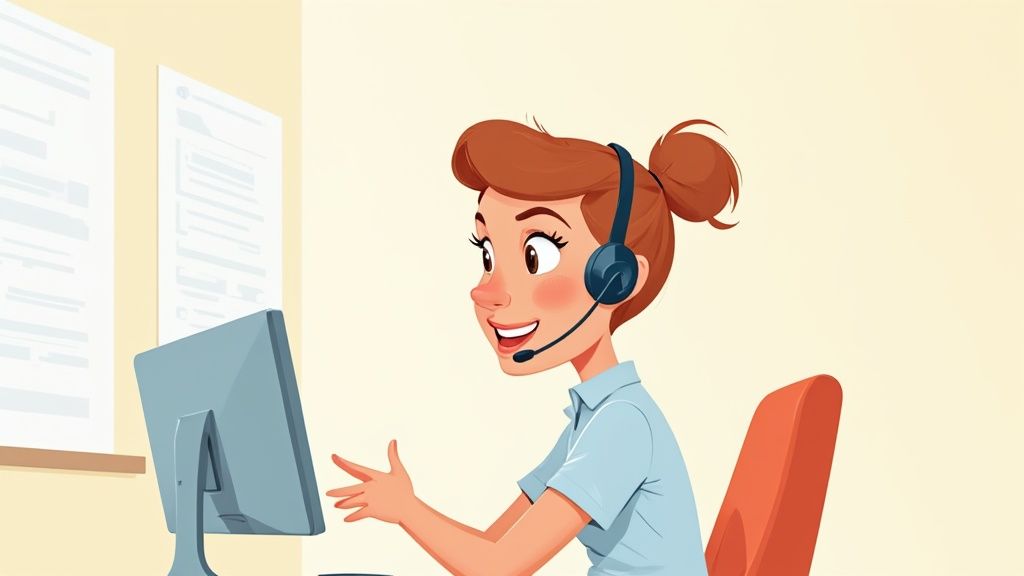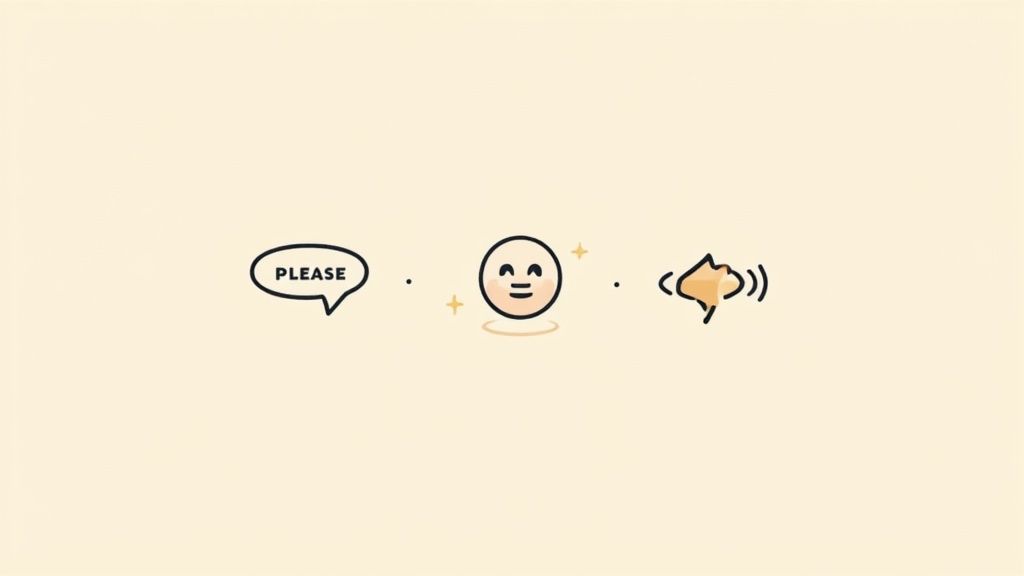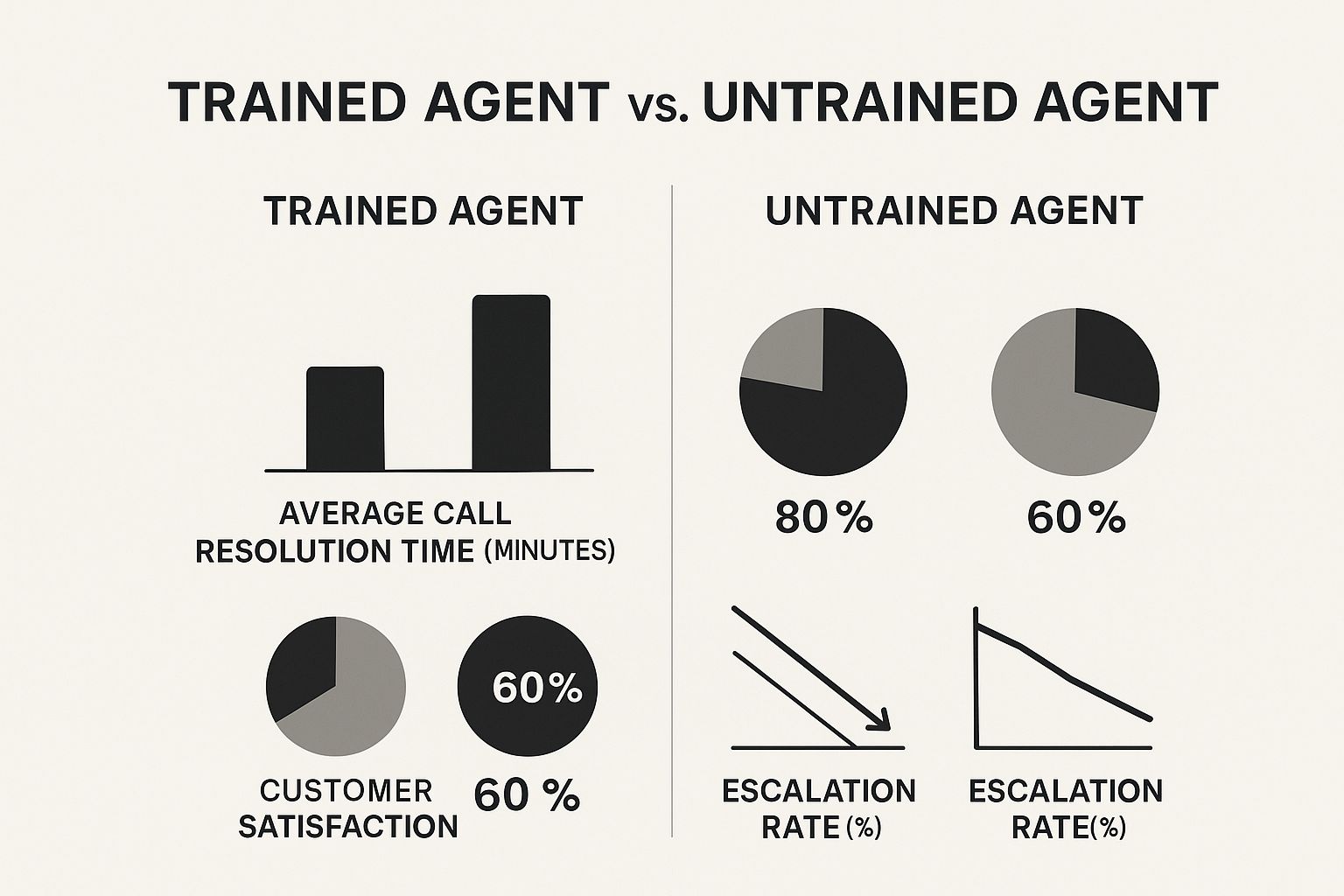A proper telephone etiquette course is what gives your team the tools to handle customer calls with confidence, consistency, and a real sense of skill. This isn't just about learning to be polite. Think of it as a strategic investment—one that pays off by creating positive first impressions, resolving issues without friction, and turning every single phone call into a chance to build a loyal customer.
Why Phone Skills Are Your New First Impression
In an era of endless emails and faceless chatbots, a real-time phone call is often the first genuine human connection a customer has with your business. That single conversation becomes your new storefront. It's your digital handshake, and it’s your best shot at building—or breaking—trust. Every ring is a moment of truth where your brand’s reputation is on the line.
This makes professional phone communication a hard business necessity, not some soft skill you can ignore. The idea that good phone manners are just "common sense" is a costly myth. Without some kind of formal training, you're guaranteed to get inconsistencies. One employee might be a natural, but another could accidentally come across as impatient or confused. That jarring experience is what damages your brand.
Here’s a quick breakdown of the core principles any good telephone etiquette training should cover. These are the pillars that support every successful customer interaction.
Core Pillars of Modern Telephone Etiquette
| Pillar | Description |
|---|---|
| Active Listening | Going beyond just hearing words to truly understand the customer's needs, emotions, and underlying issues. |
| Vocal Tonality | Mastering the pitch, pace, and warmth of your voice to convey empathy, confidence, and professionalism. |
| Professional Language | Using clear, positive, and jargon-free language that avoids confusion and builds rapport. |
| Call Control Techniques | Guiding the conversation effectively, managing hold times, and ensuring a smooth, logical flow from start to finish. |
| Problem Resolution | Applying a structured approach to de-escalate difficult situations and find satisfactory solutions for the customer. |
| Brand Representation | Consistently embodying the company's values and voice in every interaction to create a unified brand experience. |
Ultimately, a structured course moves your team from a place of guessing to a place of knowing. It gives them proven techniques to manage the flow of a call, control their tone, and navigate even the most difficult conversations with grace.
The Rising Demand for Professionalism
The shift to remote and distributed teams has made this kind of standardized communication training more urgent than ever. When your team isn't sharing an office space, a telephone etiquette course ensures everyone is representing the company with the same high level of professionalism, no matter where they're located. It gets your entire staff on the same page for handling everything from a simple question to a frustrated customer.
The tangible value here isn't just a gut feeling; it’s reflected in the market itself. The global Business Etiquette Training Market, which leans heavily on communication skills, is a crystal-clear indicator of this priority.
Investing in these skills isn’t just about putting out fires or preventing bad interactions. It’s about creating a powerful competitive advantage. The numbers back this up. The Business Etiquette Training Market was valued at roughly USD 1.5 billion and is on track to nearly double, hitting USD 3.0 billion with a compound annual growth rate of about 8.5%. You can explore more data on the importance of the business etiquette market and its growth. This trend shows that companies worldwide get it: professional communication is directly tied to performance and staying competitive.
What Your Team Will Actually Learn on a Call

A proper telephone etiquette course goes way beyond vague advice like “be nice.” It’s less of a lecture and more like a workshop, where your team builds concrete skills they can put into practice on their very next call. Think of it as a structured framework for communication excellence, designed to build confidence one module at a time.
The training always starts with the absolute fundamentals of a call. This means nailing a professional, consistent opening that sets a positive tone right away, and a closing that makes the customer feel heard and confident their issue is handled. It’s all about making every single part of the conversation feel intentional.
Mastering Vocal Tone and Professional Language
Over the phone, your voice is everything. Since a caller can't see your team's body language or facial expressions, their voice becomes the entire toolkit for conveying emotion and intent. A good course teaches them how to control their vocal tone, pace, and volume to project warmth, confidence, and authority. This is the difference between sounding distracted and sounding genuinely engaged.
Professional language is the other side of that coin. Your team will learn how to ditch negative or passive phrasing for positive, action-oriented language. It’s a subtle but powerful shift.
For example:
- Instead of: “I don’t know.”
- They learn to say: “That’s a great question. Let me find out for you.”
- Instead of: “You’ll have to call another department.”
- They learn to say: “I can get you to the specialist who is best equipped to handle this. May I place you on a brief hold?”
This small change in wording empowers your employee and reassures the customer, turning what could be a frustrating dead end into a smooth, professional handoff.
A core concept here is that listening is an active skill, not a passive one. It’s about genuinely hearing what the customer is saying—not just waiting for your turn to speak. So many service interactions break down right at this point.
The Art of Active Listening and Call Control
Active listening is probably the single most critical skill taught in a telephone etiquette course. Your team will learn specific techniques to show they are fully present and understanding what's being said. This includes things like paraphrasing the customer’s issue to confirm they’ve got it right ("So, if I'm hearing you correctly, the problem is…") and asking smart, clarifying questions to get to the real root of the problem.
This kind of focused listening directly leads to better call control. When an employee truly understands the issue, they can guide the conversation toward a solution much more effectively. This skill is absolutely essential for improving first-call resolution, a make-or-break metric for customer satisfaction.
Finally, any good training covers the practical mechanics of professional call handling. This isn't fluff; it's the stuff that separates the amateurs from the pros.
- Proper Hold Procedures: This means always asking permission before putting someone on hold and giving them a realistic timeframe.
- Seamless Call Transfers: Explaining who they're transferring to and why, which ensures the customer doesn't have to repeat their story from scratch.
- Taking Accurate Messages: Gathering every necessary piece of information and confirming it back to prevent any mix-ups down the line.
These modules all work together, creating a complete skill set that ensures every employee represents your brand with polish and professionalism on every single call.
The Real Business Impact of Great Phone Skills

Let’s be honest. Investing in a telephone etiquette course isn’t just about teaching your team to be a little nicer on the phone. It’s about driving real, tangible business results that show up on your P&L statement. The skills people pick up in this kind of training have a funny way of translating directly into measurable growth, completely transforming how customers see your company.
When every single call is handled with professional grace, you’re building a bedrock of trust that pays dividends for years to come. Think about the immediate return. An employee who’s been properly trained knows how to steer a conversation, listen for what a customer actually needs, and provide clear, confident solutions.
This isn't just about making the customer feel good; it directly moves the needle on your most important metrics. Call handling times drop. First-call resolution rates climb. And your overall operational costs start to go down.
From Frustration to Loyalty
The real acid test for great phone skills always comes during a difficult call. An untrained employee, when faced with a frustrated customer, might get defensive or flustered. That’s a surefire way to escalate the situation and all but guarantee a scathing online review.
This is exactly where training proves its weight in gold. A trained professional sees a challenge, not a threat. They know how to de-escalate, show genuine empathy for the caller's problem, and calmly pivot the conversation toward a solution.
This is how you turn a potential one-star complaint into a story about exceptional service. The customer doesn't just hang up satisfied; they hang up impressed. And just like that, you've strengthened their loyalty to your brand.
The true power of a telephone etiquette course is its ability to turn your employees into brand ambassadors. A single positive interaction with a skilled agent can be more powerful than a thousand dollars in marketing, building a reputation for reliability one call at a time.
The Financial Case for Communication
This focus on communication isn't some niche concern; it's a massive business priority. The broader Business Etiquette Training Market, which heavily features phone skills, was valued at an impressive USD 28.34 billion and is projected to nearly double to USD 68.92 billion. You can read the full research on the business etiquette market to get a sense of just how seriously companies are taking this.
For smaller businesses, the impact is even more dramatic. Excellent phone support is what builds the strong, loyal customer base you need for sustainable growth. These positive experiences fuel better retention rates and, more importantly, word-of-mouth referrals—the lifeblood of any growing company. Our guide to exceptional customer service for small business explores how these principles play out on the ground.
Ultimately, investing in your team’s phone skills is one of the most direct and effective ways to protect and grow your bottom line.
How to Handle Difficult Conversations with Confidence

Let's be real: challenging calls aren't just a possibility in a service business; they're a certainty. Sooner or later, someone on your team will be on the line with a customer who is frustrated, angry, or just plain upset.
How they navigate that moment says everything about your company. A well-trained employee doesn't just put out a fire; they can turn a potentially disastrous interaction into a masterclass in customer care.
The secret isn't hiring for "good instincts" and hoping for the best. It's about giving your team a reliable framework they can fall back on when the pressure is on. Because when emotions run high, the conversation stops being about the initial problem—it becomes about making the customer feel heard, respected, and valued.
The A-E-R Framework for De-escalation
A brilliantly simple yet powerful tool for these moments is the Acknowledge, Empathize, Resolve (A-E-R) framework. It’s not a script, but a roadmap for steering a tense conversation back toward solid ground.
-
Acknowledge: Your first job is to show you're listening and validate their frustration. A simple, "I understand you're upset about the delay, and you have every right to be," can instantly change the dynamic. It signals that you're on their side, not an obstacle to be overcome.
-
Empathize: Next, you connect on a human level. This is where you show you get it. Something like, "I can only imagine how stressful that must be, especially with your tight schedule," proves you see them as a person, not just a case number.
-
Resolve: Finally, with the emotional temperature lowered, you pivot to action. Once the customer feels genuinely heard, you can say, "Okay, let's figure out how we can make this right. Here’s what I’m going to do for you right now."
The goal isn't to win an argument; it's to win the customer back. Maintaining composure and using precise de-escalation language are skills that are honed, not just inherent. This is a core focus of any effective telephone etiquette course.
Knowing When and How to Escalate
Sometimes, the person who answers the phone simply doesn't have the authority to deliver the right solution. That’s okay. A critical part of training is teaching them to recognize these limits and handle the handoff like a pro.
It’s the difference between a panicked "Uh, let me get my manager," and a confident, controlled transfer.
For example, they can frame it as a positive step: “To get you the absolute best resolution here, I’m going to bring in my team lead who has a few more tools at her disposal. Is it alright if I place you on a brief hold while I get her on the line for you?” This reframes the escalation not as a failure, but as an upgrade in service.
For extra consistency, it helps to build out a standard procedure. Our guide on a receptionist answering phone calls script is a great place to start building your own.
The best training programs have evolved far beyond basic phone manners. Top-tier providers like National Seminars Group and Learning Tree International now offer specialized courses focusing on managing these tough conversations and mastering the word choices that lead to positive outcomes. You can discover more about how these phone etiquette training courses work and see how they develop these absolutely essential skills in your team.
Choosing the Right Telephone Etiquette Course
Picking a telephone etiquette course isn’t like ordering paper clips or toner cartridges. The right program can genuinely transform your customer relationships for the better. The wrong one? It’s just a sinkhole for your time and budget.
Let's be clear: not all training is created equal. Your goal is to find something that equips your team with real, lasting skills, not just a fleeting motivational high that wears off by Monday morning.
Think of it like hiring a personal trainer for your team. You wouldn’t just grab the first person offering a generic, one-size-fits-all workout. You'd find someone who first assesses your team’s current state, understands what you want to achieve, and then builds a custom plan that actually works. The same exact logic applies here.
Evaluate the Curriculum and Customization
The very first thing you need to dig into is the course content itself. A quality program goes way beyond "be polite" and gets into the nitty-gritty mechanics of great call handling. Crucially, you should look for a curriculum that can be tailored to your business.
Why? Because your business has its own unique set of challenges.
For example, a training course for an emergency plumbing service needs to be heavy on empathy and de-escalation for callers who are, frankly, panicking. On the other hand, a course for a tech support team should probably focus on breaking down complex technical jargon into simple, bite-sized language that anyone can understand.
A generic, off-the-shelf telephone etiquette course might cover the basics, but it won’t arm your team for the specific, high-stakes scenarios they walk into every single day. The best training providers will actually work with you. They’ll build role-playing exercises around real situations your team has faced, making the training instantly relevant and practical.
Just look at the difference this kind of focused training makes. The infographic below shows the stark contrast in performance between agents who've had targeted training and those who haven't.

The data doesn't lie. Trained agents don't just create happier customers; they solve problems faster and escalate fewer calls. That’s a direct impact on your operational efficiency and, ultimately, your bottom line.
Consider the Training Format
How the training gets delivered is just as important as what gets taught. You need a format that actually meshes with your team's workflow and learning preferences. Not everyone learns the same way.
Let’s look at the most common delivery methods.
Comparison of Training Course Delivery Formats
| Format | Pros | Cons | Best For |
|---|---|---|---|
| Online Courses | Incredible flexibility; staff can learn at their own pace without disrupting operations. Great for remote or distributed teams. | Can lack direct, interactive feedback. Requires self-discipline from participants. | Businesses that can't afford to shut down for a full day of training or have teams in multiple locations. |
| In-Person Workshops | Hands-on, interactive role-playing with immediate instructor feedback. Excellent for building team cohesion. | Can be more expensive and logistically complex. Requires taking staff off their regular duties for a set time. | Teams that thrive on collaboration and need to practice complex interpersonal skills in a live setting. |
| Hybrid Models | The best of both worlds. Combines self-paced online learning for core concepts with live sessions for practice. | Can be more involved to coordinate. Requires seamless integration between the online and live components. | Businesses looking for a balance of flexibility for foundational knowledge and deep, interactive skill-building. |
So, what's the takeaway here?
Ultimately, the best choice boils down to your specific needs and team dynamics. The real key is to find a program that actively engages your team. Passive learning—just sitting and listening—rarely sticks. Look for a course that emphasizes active participation, practical exercises, and real-time feedback. That's where the real learning happens.
Answering Your Key Questions About Phone Training
Deciding to invest in a telephone etiquette course is a big move. It's totally natural to have questions about how it all works and what you'll actually get out of it. Let's clear up some of the most common questions so you can make a decision you feel good about.
You're not just buying another service; you're fundamentally upgrading one of your business's most critical touchpoints. Understanding the nuts and bolts is key.
How Long Does a Typical Course Take?
There's no one-size-fits-all answer here, because good programs are built to fit your schedule, not the other way around. A course can be as quick as a single, focused half-day workshop or a more in-depth program that spans a few sessions over several weeks.
The right length really boils down to how deep you want to go. A shorter course will hit the essentials, like professional greetings and how to control a call. A longer one gives you the space to dive into advanced skills like de-escalation, with plenty of time for hands-on practice and detailed feedback.
Think of it this way: a quick session is a tune-up, while a multi-week program is a complete engine rebuild for your team's communication skills.
The most effective training isn't about sitting through a lecture. It’s about active participation. The best courses build in significant time for role-playing, which is where the real learning and confidence-building happens.
This is what makes the lessons stick. It turns abstract ideas into real, repeatable habits your team can start using the very next day.
How Can We Measure the ROI of This Training?
This is a great question, and measuring the return on phone training is more straightforward than you might think. You can track a mix of hard data and softer, qualitative feedback to get a crystal-clear picture of the impact.
For the hard numbers, you'll want to start monitoring a few key performance indicators (KPIs) before and after the training. These metrics give you a data-backed story of your team's improvement.
- First-Call Resolution (FCR): Are more customers getting their issues solved on the very first call? This is a massive win for both efficiency and customer happiness.
- Average Call Handling Time (AHT): Is your team resolving issues faster without sacrificing quality?
- Customer Satisfaction (CSAT) Scores: Are those post-call survey scores ticking up?
- Call Escalation Rates: Are fewer calls getting kicked up the chain to a manager? This shows your frontline team is more confident and capable.
Beyond the numbers, listen for the qualitative shifts. Pull up call recordings and just listen. You should hear a tangible difference in tone, professionalism, and confidence. You'll also likely see a drop in customer complaints about phone interactions, which is always a good sign.
Can a Course Be Customized for Our Industry?
Absolutely. In fact, it should be. The most valuable phone training is the kind that speaks your company's language and tackles the real-world problems your team faces every single day.
A top-tier training provider will sit down with you to tailor the material to your operational reality. This isn't just a nice-to-have; it's essential.
Customization often includes:
- Using your industry's specific terminology and acronyms.
- Building role-playing scenarios your team actually experiences (e.g., handling a tricky healthcare privacy question is very different from a technical support problem).
- Aligning the training with your company's unique brand voice and core values.
This kind of personalization is the difference between generic advice and a strategic tool that's been sharpened just for your team's success.
Tired of missing calls and losing jobs to voicemail? Marlie Ai provides a 24/7 AI phone assistant that ensures every call is answered instantly and professionally. From booking jobs to taking payments, Marlie saves you time and captures more revenue, all for just a fraction of the cost of traditional answering services. See how Marlie can transform your call handling today.

